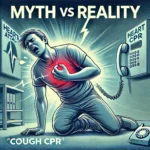How Long Can a Human Go Without a Heartbeat Before It’s Too Late?
No heartbeat. No breathing. No signs of life.
Most people assume that when the heart stops, death is instant. But that’s not always true. In some cases, people have been revived after more than an hour—thanks to CPR and medical advances.
So, how long can a person survive without a heartbeat? And what makes survival possible? Let’s find out.
What Happens When the Heart Stops?
When the heart stops beating, oxygenated blood no longer reaches the brain, organs, and tissues.
🫀 Within 10 seconds – The brain shuts down. A person collapses and loses consciousness.
🫀 Within 1-2 minutes – Brain cells start to die due to lack of oxygen.
🫀 Within 4-6 minutes – Permanent brain damage may occur.
🫀 After 10 minutes – Survival chances drop significantly. Most people suffer severe brain damage or death.
💡 But CPR can delay this process! By pushing oxygen-rich blood to the brain and organs, CPR buys time until medical help arrives.
Real Cases of Survival Against the Odds
Despite the typical 10-minute window, some people have survived much longer without a heartbeat.
📌 Case #1: The Woman Who Came Back After 6 Hours
In 2019, a woman in Spain suffered severe hypothermia while hiking. Her heart stopped for 6 hours, but doctors performed continuous CPR. When they warmed her body, her heart restarted.
📌 Case #2: 45 Minutes of CPR Saves a Life
A man in Ohio went into cardiac arrest. Paramedics performed 45 minutes of CPR before his heart restarted. He made a full recovery.
📌 Case #3: Frozen for Hours, Then Revived
In 1986, a skier in Norway was trapped under ice for over an hour. Her heart stopped, but doctors warmed her body and restarted her heart. She survived without brain damage.
💡 How is this possible? Cold temperatures slow down metabolism, reducing the brain’s oxygen needs. That’s why hypothermia victims sometimes survive longer without a heartbeat.
How Long Should You Perform CPR?
Never assume it’s “too late.”
🚨 CPR should continue until:
✔️ Medical professionals take over
✔️ The person shows signs of life
✔️ A doctor declares death
🚨 In cases of drowning, hypothermia, or drug overdose, extended CPR can save lives—even after an hour!
Why Immediate CPR Matters
If someone collapses, every second counts. Without CPR:
🔴 Survival rates drop 10% per minute.
🔴 Brain damage starts within 4 minutes.
🔴 After 10 minutes, survival is unlikely—unless CPR is given.
But with fast, effective chest compressions, you can keep blood flowing and give the victim a fighting chance.
Would you know what to do in an emergency? If not, it’s time to learn.
Take a CPR Class – Be Ready to Save a Life
A cardiac arrest can happen anywhere. Knowing CPR can make the difference between life and death.
📍 Register for a class: Sign up here
📍 Need group training? Visit our website
📍 Have questions? Contact us!
📧 Email: contact@arisesafety.com
📞 Call/Text: 317-961-1480
💙 Don’t wait for an emergency. Be prepared. Learn CPR today! 💙





